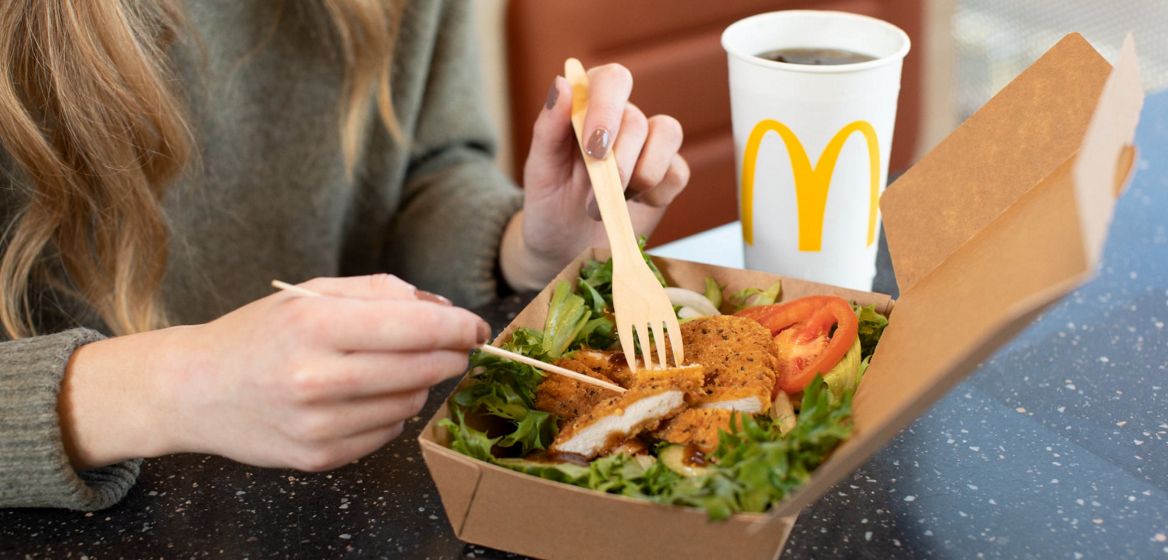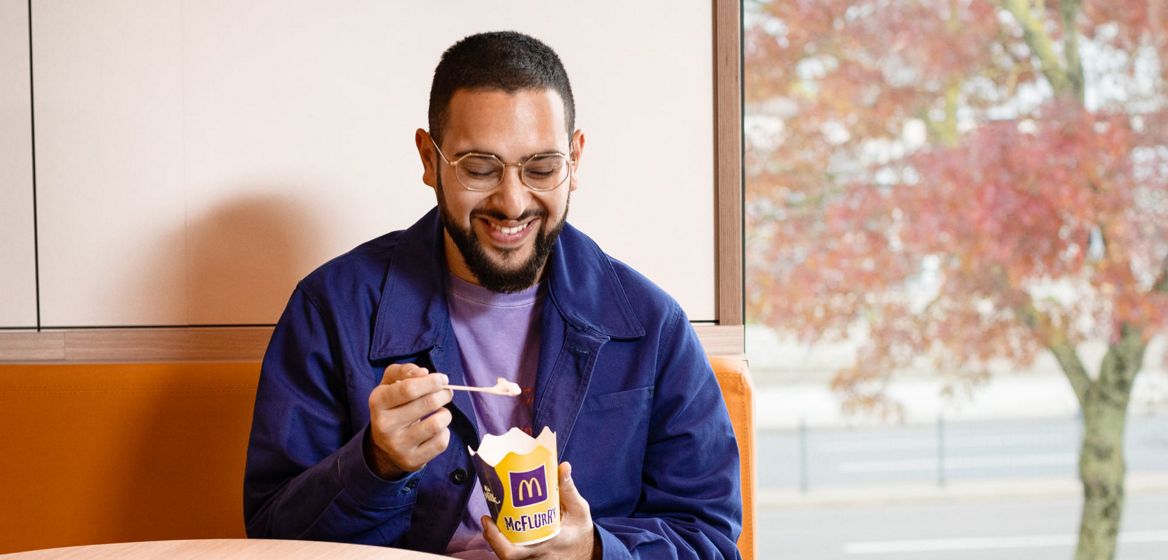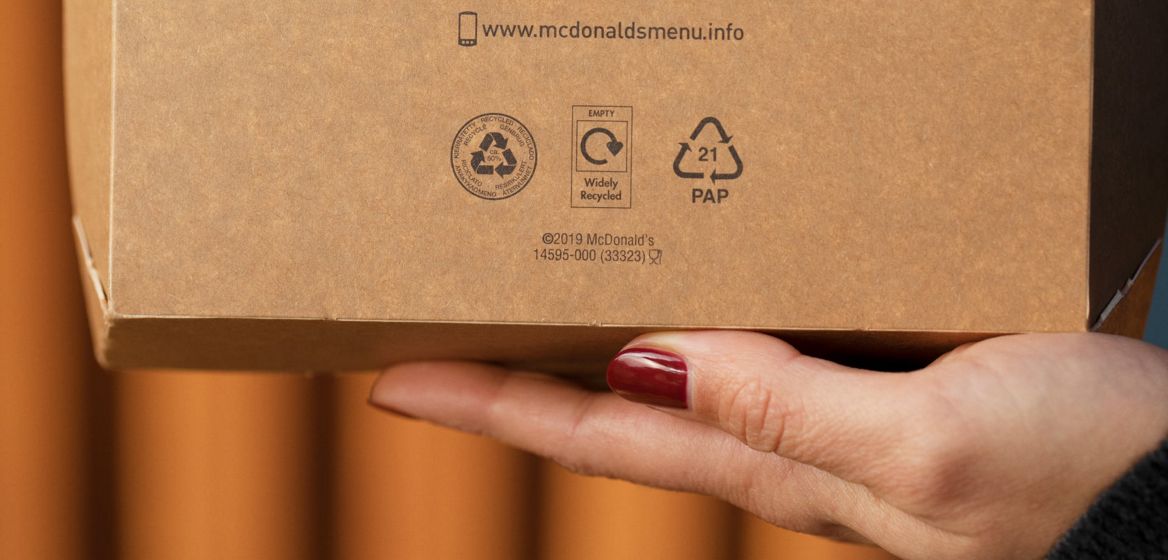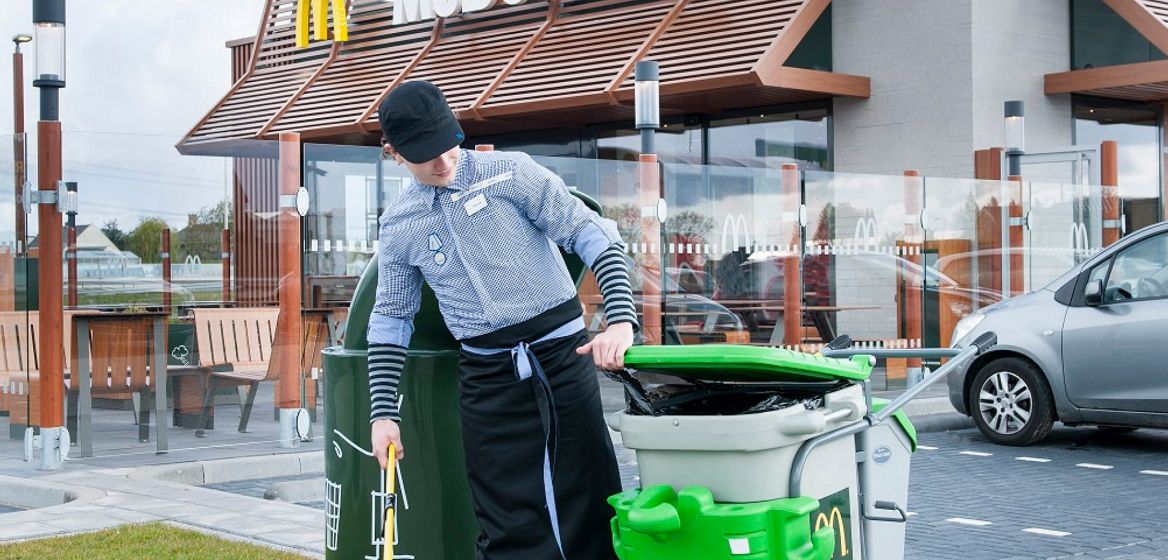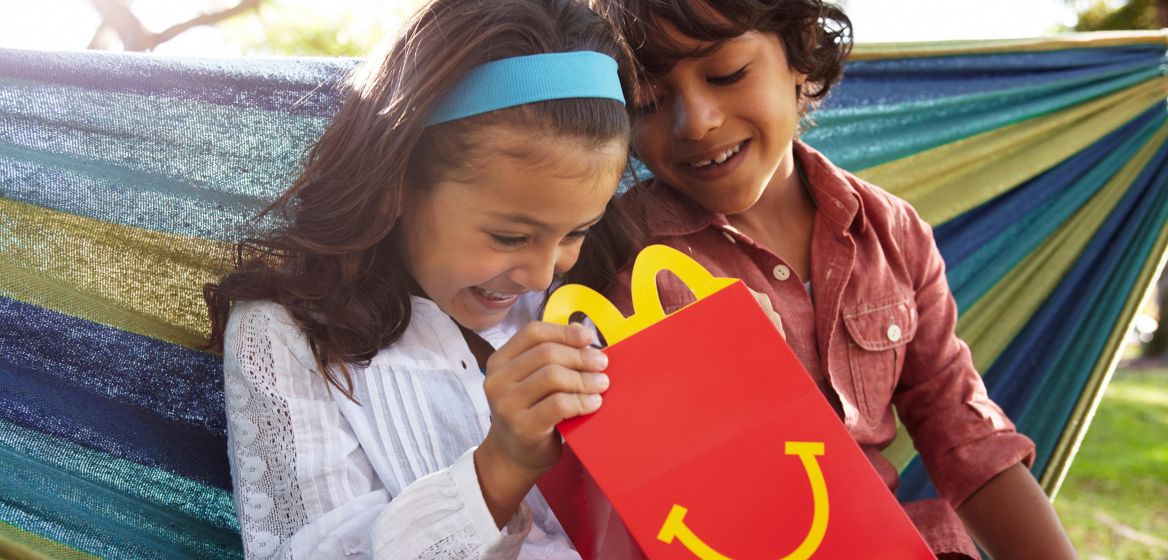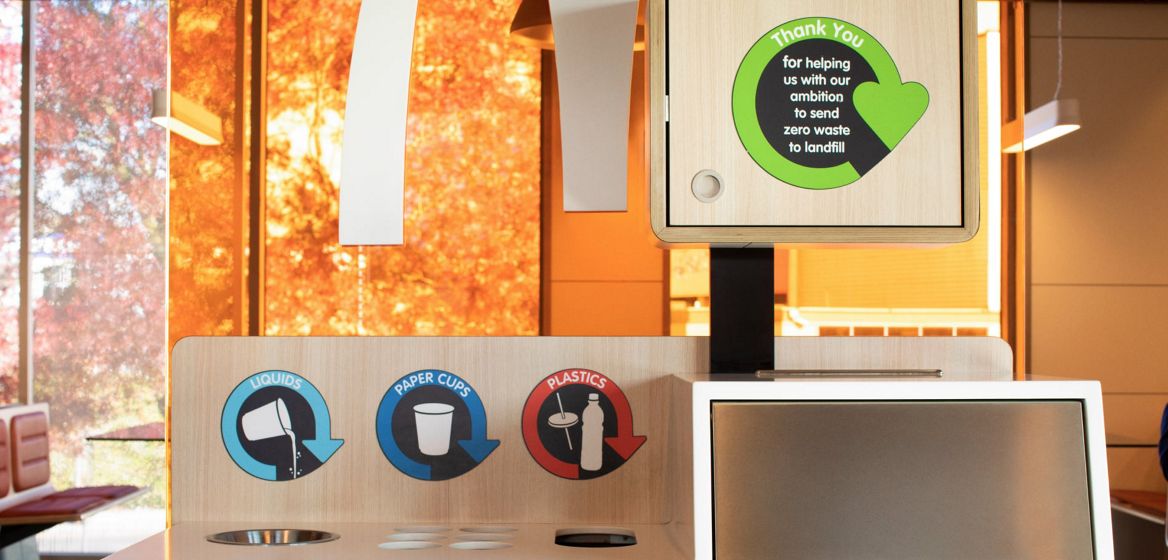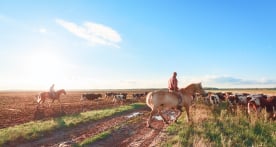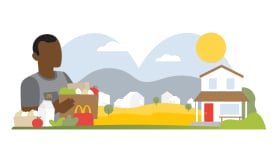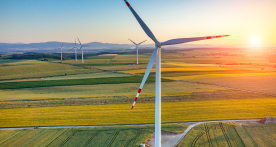Packaging, Toys & Waste
We are accelerating solutions that reduce waste while also transitioning to more sustainable packaging and toy materials.
Packaging plays an important role in reducing food waste and helping us serve hot and freshly prepared food quickly and safely to our customers. Our ambition is that the packaging and materials we use in our restaurants are part of a circular economy rather than becoming waste. Our packaging, toys and waste strategies help keep our communities clean, protect the planet for future generations and support our long-term business resilience.
Recent Progress
As of 2021, approximately 82.7% of our primary packaging materials, and 96.8%1 of our primary fiber packaging comes from recycled or certified sources, aiming for 100% certified, recycled or renewable materials by the end of 2025.
Our ambition is to drastically reduce plastics in Happy Meal toys2 and transition to more sustainable materials by the end of 2025. Since 2018, we have reduced virgin fossil fuel-based plastic in Happy Meal toys by 24.4% globally, and we continue to work on sourcing materials used in Happy Meal toys from renewable, recycled or certified sources.
After extensive evaluation of our waste programs and the global recycling landscape, we are adjusting our 2018 commitment to focus on implementing global and local solutions across our business to expand the reduction, reuse or recycling of guest packaging, and create demand for recycled materials by the end of 2025.
Allowing flexible solutions will create a larger and lasting impact because markets can address localized challenges that are preventing progress, including insufficient recycling infrastructure, recycling policies and packaging material innovation.
Jump to Our Performance on this page for more details of progress against our goals.
Our Strategy
Our approach takes a comprehensive look at the footprint of our packaging and toys. This includes designing out waste and advancing material recovery and reuse throughout our value chain. We’re committed to advancing a circular economy – where we help keep materials in use rather than relying on new ones. We’re doing this by investing and engaging in strategic partnerships to address systemic challenges such as recycling infrastructure, demand for recycled content and development of new materials.
Our strategy is based on the following five focus areas, with more information shared below.
- Eliminating unnecessary packaging and streamlining materials for easier recovery in addition to innovation for new materials, testing reusable solutions and creating opportunities for behavior change to reduce usage.
- Transitioning away from virgin fossil fuel-based plastics in our primary guest packaging to 100% renewable, recycled or certified sources by the end of 2025 and to drastically reduce virgin fossil-fuel based plastics in our Happy Meal toys.
- Advancing a circular economy through the implementation of many tools to improve recycling and repurposing of materials, making it easier for customers to recycle, and reduce the waste coming out of our restaurants.
- Increasing the use of recycled materials throughout our System to drive global demand for recycled content – including in packaging, toys and design materials for restaurants and facilities.
- Partnering to increase scale and impact of a circular economy approach to packaging and waste. By engaging in strategic partnerships with brands and nongovernmental organizations (NGOs), we can increase adoption of circularity across our industry.
Eliminating Unnecessary Packaging and Streamlining Materials for Easier Recovery
For years, a key pillar of our packaging strategy has been to reduce the materials we use by lightweighting and optimizing our packaging. We’ll accelerate our progress to reduce materials across our portfolio, redesigning some of our most iconic products to eliminate unnecessary packaging and increase opportunities for recovery.
Market examples of efforts include the following:
- By switching to fiber wraps instead of paperboard cartons, McDonald’s Netherlands has saved 250 metric tons of packaging.
- Reducing straw and lid usage in select European and Latin American countries through fiber or plastic strawless lids and “upon request” programs.
- In Latin America, our Developmental Licensee, Arcos Dorados has removed all lids and straws from cold drinks for dine-in customers. Please see pages 74–75 of the 2021 Social Impact and Sustainable Development Report published by Arcos Dorados to learn more about Packaging, Toys & Waste initiatives being explored across Latin America and the Caribbean.
- McDonald’s Canada has switched to napkins that are 20% smaller and produced with 100% recycled fiber.
- Germany, France and the Netherlands transitioned from clamshells to paper wraps and bags for select menu items, eliminating approximately 5,000 metric tons of packaging annually.
Find out more about what individual markets are doing in the Our Actions section below.
Leading the Industry in Sourcing Materials Responsibly
We continue to be a leader in the industry in sourcing materials responsibly and advancing new technologies to help us meet the challenges of today. We partner with our suppliers and other innovators, accelerating ideas through a rigorous development cycle to refine and deliver solutions against our stated goals.
- Clear cups sourced from recycled and biobased materials, including contributions from McDonald’s used cooking oil, were tested in 28 select U.S. restaurants as of 2022. The test cups are sourced from a 50/50 mix of post-consumer plastic material and biobased material. We're using a mass balance method which allows us to measure and track recycled and biobased inputs being used in a process that also mixes traditional fossil-fuel sources.
- We advanced innovative molded fiber technologies to replace plastic lids and sundae cups. This fiber-based renewable solution eliminated more than 1,500 metric tons of plastics in France annually. We’re building capacity to deploy throughout Europe and other markets around the world.
- New pressed certified paperboard cutlery technology launched in Ireland, replacing a portion of difficult-to-recycle plastic, and will be further rolled-out across the U.K. by 2023.
Find out more about our Responsible Sourcing and how we are working to protect Nature, Forests & Water.
Transitioning Away From Virgin Fossil Fuel-Based Plastics
While our goals focus on all packaging materials, our plastics strategy specifically focuses on:
- Removing virgin fossil fuel-based plastics from our primary guest packaging where feasible.
- Drastically reducing the use of virgin fossil fuel-based plastics in Happy Meal toys and prioritizing fiber-based toys over sustainable plastics (bio-based/recycled) where feasible.2
- Reducing small plastic primary guest packaging used in our System that is hard to recycle and unnecessary for safety or functionality, such as straws, plastic bags and cutlery.
- Prioritizing innovation of new materials, redesigning plastic packaging to be more recyclable, and increasing use of recycled plastic in our packaging, and beyond, to drive demand for recycled plastic.
Advancing a Circular Economy
Our goal is to implement global and local solutions across our business to expand the reduction, recycling, recovery or reuse of guest packaging and help create demand for recycled materials.
We believe that a variety of tools will be needed to advance a circular economy and that markets will need to utilize different tools that deliver the right environmental outcomes for their geography, while meeting our customer and Franchisee needs.
In markets that have a developed waste infrastructure that is widely accessible and robust, we’re offering guests the opportunity to recycle packaging in restaurants. In areas where recycling infrastructure varies, we’ll drive advocacy and invest in partnerships to help advance the development of recycling systems.
Examples of actions we are taking to achieve our ambitions include:
- Reducing the volume of waste from guest packaging in-store.
- Facilitating the recycling of guest packaging in restaurants where possible.
- Partnering with waste management companies, suppliers and other brands to remove barriers around recycling, reuse or composting.
- Working with suppliers to optimize our packaging for recycling.
- Using on-packaging labeling to make recycling easier for guests.
- Increasing recycled content in packaging and restaurant design and operation materials to drive demand for recycling.
- Utilizing transport logistics to collect and back-haul recyclables when they deliver supplies to our restaurants – helping to recycle materials from restaurants in remote areas and reduce trucks on the road.
- Assessing how we might use reusable packaging in our system, in addition to recycling and material reduction, through system pilots in France, Germany, Taiwan and the U.S., and a pilot with TerraCycle®’s circular packaging service, Loop, in the U.K.
Reducing Litter
We’re partnering with Franchisees to support community-level anti-litter initiatives such as consumer communication campaigns and cleanup days in parts of the U.S., Europe and many other markets.
Additionally, we’re collaborating with companies and nonprofit organizations that aim to end litter, support the development and expansion of recycling plastic, and promote recycling in communities. For example, McDonald’s USA partners with Keep America Beautiful, helping to advance their work to end littering, improve recycling and beautify communities across the country.
Please read more about how markets are helping to improve packaging recycling and reuse in the Our Actions section below.
Increasing Our Use of Recycled Materials
To fulfil our ambition to increase recycled content in our packaging, we need more materials to be recycled. However, today low demand for food-grade recycled material means it is in limited supply. We intend to expand our use of recycled materials, which will play a role in creating a market for these materials. We’re partnering with other brands and industry organizations, such as Polypropylene Recycling Coalition, as part of the Next Gen Cup Challenge to leverage scale and create higher value for food-safe, post-consumer recycled materials.
We currently have recycled content in fiber coffee, frappe, sundae and cold cups in many markets. With limited supply, our focus is to increase recycled content in paper bags, napkins and cup carriers first. Recycled plastic is currently found in plastic beverage and ice-cream cups and select plastic lids in most European markets.
Partnering to Increase Scale of Solutions
Addressing circularity is not a challenge we can tackle alone. To help drive change at scale, we are engaging with the wider business community, NGO partners, political stakeholders and academics, as well as our Franchisees, suppliers, customers and restaurant crew.
Examples of our partnerships include:
- Serving as a Principal Member of ReSource: Plastic, World Wildlife Fund (WWF)’s platform for translating large-scale corporate commitments into measurable progress on plastic waste reduction. Through an innovative measurement tool, ReSource is bringing transparent reporting and collective action to the forefront of corporate strategy to help companies maximize, and multiply, their potential for impact.
- Membership in the Bioplastic Feedstock Alliance (BFA), a WWF-led consortium of companies, NGOs, and academia advancing thought leadership on responsibly sourced bio-based plastic and the role the material can play in supporting circular systems.
- McDonald’s USA. teamed up with Starbucks and Closed Loop Partners as founding members of the NextGen Consortium in 2018, with an aim to take on the global issue of single-use food packaging waste. Building on this foundation, in 2020, the Consortium joined The Recycling Partnership’s Polypropylene Recycling Coalition as a Steering Committee member. In this role, the Consortium allocated grants worth millions of dollars to develop infrastructure needed to enhance polypropylene recycling – something McDonald’s and Starbucks advanced a year later with further investments of $5 million each. This latest funding will enable the Consortium to drive greater improvements in the sustainable packaging ecosystem while supporting testing of reusable packaging systems and an exploration of the circularity of additional packaging materials.
- Member of the Foodservice Packaging Institute’s (FPI) Paper Recovery Alliance (PRA) and Plastics Recovery Group (PRG), the Australian Packaging Covenant and Sustainable Packaging Coalition, as well as actively involved in initiatives including the recent creation of the APR Design® Guide for Plastics Recyclability with the Association of Plastic Recyclers.
Product Stewardship
McDonald’s packaging materials comply with state, federal and national-level laws and regulations, including the U.S. Food and Drug Administration (FDA) and EU, and verify through chemical testing.
We are committed to removing all added fluorinated compounds from our guest packaging materials globally by 2025.3
Our continual product stewardship process includes evaluation and robust testing for chemicals used in our packaging. This helps ensure that we serve food in packaging that is safe and functional.
We have already eliminated a significant subset of Perfluoroalkyl and Polyfluoroalkyl Substances (PFAS), including Perfluorooctanoic acid (PFOA) and Perfluorooctanesulfonic acid (PFOS), and BPA/BPS and phthalates from our guest packaging.
By the end of 2020, less than 7.5% of our guest packaging items still contained added fluorinated compounds.3 For these items, we continue our work to find and apply alternative coating materials that offer the right grease-resistant barriers.
Goal
Source 100% of our primary guest packaging from renewable, recycled or certified materials by the end of 2025.
Progress
By the end of 2021, we were approximately 82.7% of the way toward our goal to source primary guest packaging from renewable, recycled or certified sources by the end of 2025.
Approximately 96.8%1 of our primary fiber-based guest packaging, was sourced from recycled or certified sources in 2021.
Goal
Drastically reduce plastics in Happy Meal toys around the globe and transition to more sustainable materials by the end of 2025.
Progress
Achieving this goal is expected to result in an approximately 90% reduction in the virgin fossil fuel-based plastic used to make Happy Meal toys.
Since 2018, we have reduced virgin fossil fuel-based plastic in Happy Meal toys by 24.4% globally, and we continue to work on sourcing materials used in Happy Meal toys from renewable, recycled or certified sources.
Goal
By the end of 2025, we implement global and local solutions across our business to advance the reduction, reuse or recycling of guest packaging, and help create demand for recycled materials.
In 2018, McDonald’s set the global public commitment to recycle guest packaging in 100% of McDonald’s restaurants, by the end of 2025. By the end of 2020, over 25% of restaurants in our 30 largest markets offered customers the opportunity to recycle packaging.
Across the globe, waste and recycling infrastructure differs heavily. While our current recycling goal is relevant and feasible for markets with advanced infrastructure, it does not drive impactful change in markets where infrastructure is still developing.
That is why in 2021, we revised the global recycling goal “requiring recycling of at least one item in 100% of all restaurants” to a broader goal that allows market flexibility based on local infrastructure. This shift will enable markets to drive change that is most impactful in their geography.
Progress
By the end of 2021, in our top 35 markets, on average 35% of restaurants offered guests the opportunity to recycle packaging items. In these restaurants, guest packaging is collected in customer-facing recycling bins or collected for sorting and recycling back-of-house or off-site.
In regions where infrastructure is more robust, we see greater progress. For example, on average, approximately 78% of our restaurants in McDonald’s largest European markets are already providing recycling for guest packaging.
Goal
Ensure all primary guest packaging is free from added fluorinated compounds by the end of 2025.
Progress
By the end of 2020, less than 7.5% of our guest packaging items still contained added fluorinated compounds. For these items, we continue our work to find and apply alternative coating materials that offer the right grease-resistant barriers.
McDonald’s packaging materials comply with state, federal, and national-level laws and regulations, including the U.S. Food and Drug Administration (FDA) and EU, and verify through chemical testing.
Our Actions
As a global company operating in over 100 markets, there is no “one size fits all” when it comes to packaging and recycling solutions. Local waste infrastructure and customer preferences make each market unique. That’s why local pilots are so important to identify sustainable packaging solutions. The examples below illustrate the type of progress and forward-thinking solutions that our markets have implemented, helping McDonald’s to scale positive solutions across the globe:
- We are deploying alternatives to plastic cutlery in several markets, including transitioning to wooden cutlery in Australia, Europe, China and India. This has led to a reduction of over 2,600 metric tons of plastic annually.
- Across several markets in Latin America, Arcos Dorados replaced plastic packaging such as salad plates with non-plastic alternatives.
- The redesign of McFlurry® packaging eliminated the plastic lid, removing about 1,200 metric tons of plastic annually across EU markets.
- In China, McDonald’s has begun to phase out plastic straws utilizing a strawless lid for cold drinks in around 1,000 restaurants across Beijing, Shanghai, Guangzhou and Shenzhen. The move is expected to reduce 400 metric tons of plastic waste per year.
Recycling Happy Meal Toys
McDonald’s Japan runs a program with the Japanese Ministry of the Environment to collect plastic Happy Meal toys and convert them into restaurant serving trays. To date, the program has collected over 7.5 million plastic toys and turned them into trays.
Infrastructure and Recycling Solutions
We know our guests don’t want to have to choose between sustainability or convenience, which is why we are working to make it easier for them to recycle.
In Germany, Austria, Czech Republic and Slovakia, our crew collect and separate recyclable packaging, while in the Netherlands, we take the process off-site completely, sending customer waste to an innovative waste-sorting facility.
In the U.K., we have well-established waste separation systems in stores that enable us to capture our paper cups – items made with high-value material – and recycle them in partnership with a local, specialized cup-recycling facility.
In markets where recycling infrastructure is a challenge, we’re focusing on addressing systemic constraints through partnerships and informing local recycling policy.
McDonald’s Food Waste Journey
McDonald’s has developed a system to minimize food waste in our supply chain using our food waste hierarchy, which is adapted from the U.S. Environmental Protection Agency’s (EPA) Food Recovery Hierarchy. Our approach is based on global best practices to extend the value of food, and is a critical part of McDonald’s sustainability journey and purpose to feed and foster communities. It is supported by our Global Food Disposition Policy to help ensure that food is not wasted in our restaurants or supply chain facilities.
In restaurants in the U.S., one of the key ways we are addressing food waste reduction is through enabling food donations, including contributions of excess ingredients. In 2021, we continued to expand salvage methods so that ingredients such as dairy, pork and poultry could be donated directly to charities located in the U.S. See our Community Impact page for more examples of how food donations are being executed in our markets.
Meeting Customer Expectations of Convenience, Safety and Sustainability
The COVID-19 pandemic has highlighted the importance of food packaging and personal safety equipment, such as gloves and masks. We are mindful of short-term challenges, such as additional waste caused by disposable safety wear, as well as some related increases in plastic use in operational procedures.
Hygiene and safety are at the forefront of customers’ minds, and our challenge is to ensure they are balanced with long-term sustainability. Visit our Food Safety page to learn more about our commitment to food safety and sustainability.
Key Definitions
- Certified sources refer to suppliers of primary fiber-based packaging and toys to the McDonald’s System which comply with the Forest Management and Chain of Custody certification requirements set out by one of the following schemes: Forest Stewardship Council™ (FSC®); Programme for the Endorsement of Forest Certification (PEFC) or PEFC-endorsed national systems including, for example, Sustainable Forestry Initiative® (SFI®), CSA Group (Canada) and Cerflor (Brazil).
- Perfluorinated compounds are known to be historically persistent in the environment. McDonald’s commits to not intentionally adding fluorinated compounds through our processes, but fluorinated compounds present in the local environment make it difficult to remove all traces of fluorine from packaging.
- Primary guest packaging refers to disposable products used to package guest food on premises at McDonald’s restaurants which is given to customers in all order channels, including containers, cups, clamshells, wraps, foodservice bags, napkins, folding cartons, salad bowls, lids, straws, napkins and cup carriers, and Happy Meal book and toy packaging.
- Recycled sources refer to material that has been reprocessed from recovered (reclaimed) material by means of a manufacturing process and made into a final product or into a component for incorporation into a product. Recycled material applies to plastics and fiber.
- Recycling refers to the collection of waste in such a way that landfill or energy recovery can be avoided, and materials can be recycled or composted into a new product.
- Renewable sources refer to material that is composed of biomass from a living source and that can be continually replenished. Renewable applies to plastics only, not fiber. Source: ISO 14021:2016 for plastic, ASTM 6866 or ISO 16620-2.
- Third-party verification means that an independent accredited organization has reviewed the manufacturing process of a product and has determined that the final product complies with standards for the attributed claim. Credible third parties include professional auditing and certification bodies.
- Virgin fossil fuel-based plastics/Conventional/Traditional plastic: Plastics made from fossil fuel feedstock.
Please refer to Our Nature, Forests & Water page for additional definitions.
Footnotes
1 Information updated as of August 15, 2022.
2 Toys: Scope: Inclusive of all toys. Fiber-based toys or fiber components in the toys: 100% certified fiber required. All other materials: McDonald’s ambition is to reduce the use of virgin fossil fuel-based plastics, offer sustainable toys by the end of 2025 and not manufacture electronics and batteries in Happy Meal toys globally. For bio- and plant-based plastics to be considered sustainable for McDonald’s, a minimum of 60% of plastic weight is required to come from recycled or renewable content or a combination of recycled and renewable content, though in many practical applications we anticipate that percentage will be much higher. The remaining 40% may be conventional fossil fuel-based material. These thresholds were developed in conjunction with input from NGOs, external manufacturing partners and scientists, and based on an assessment of sustainable toy and packaging industry leaders so that our targets reflected current sustainable engineering capabilities to maintain safety and functionality. Our efforts will result in an approximate 90% reduction in virgin fossil fuel-based plastic use against a 2018 baseline. Fiber-based packaging made from 100% recycled sources must be third-party verified, unless certified under a Chain of Custody Forest Management standard. Source: ISO 14021:2016. McDonald’s requires all wood fiber sourced from Argentina, Cambodia, China, Indonesia, Laos, Malaysia, Russia and Vietnam to be FSC® certified or FSC Controlled Wood sources with full chain of custody certification. Russia is included for the purposes of performance reporting to the end of December 2021. The thresholds described above do not include the presence of adhesives, glues, inks, paints and coatings.
2 Packaging: Scope: Inclusive of centrally managed guest packaging and Happy Meal book and toy packaging. Renewable sources refer to material that is composed of biomass from a living source and that can be continually replenished. Renewable applies to plastics only, not fiber. Source: ISO 14021:2016 for plastic, ASTM 6866 or ISO 16620-2. Fiber-based packaging made from 100% recycled sources must be third-party verified, unless certified under a Chain of Custody Forest Management standard. McDonald’s requires all wood fiber sourced from Argentina, Cambodia, China, Indonesia, Laos, Malaysia, Russia and Vietnam to be FSC® certified or FSC Controlled Wood sources with full chain of custody certification. Perfluorinated compounds are known to be historically persistent in the environment. McDonald’s commits to not intentionally adding fluorinated compounds through our processes, but fluorinated compounds present in the local environment make it difficult to remove all traces of fluorine from packaging. Please refer to Our Nature, Forests & Water page for additional definitions. Exclusions: Primary fiber-based packaging in food packaged off-site of McDonald’s restaurants, tray liners and limited locally sourced items.
Latest Stories
More in Our Purpose & Impact

